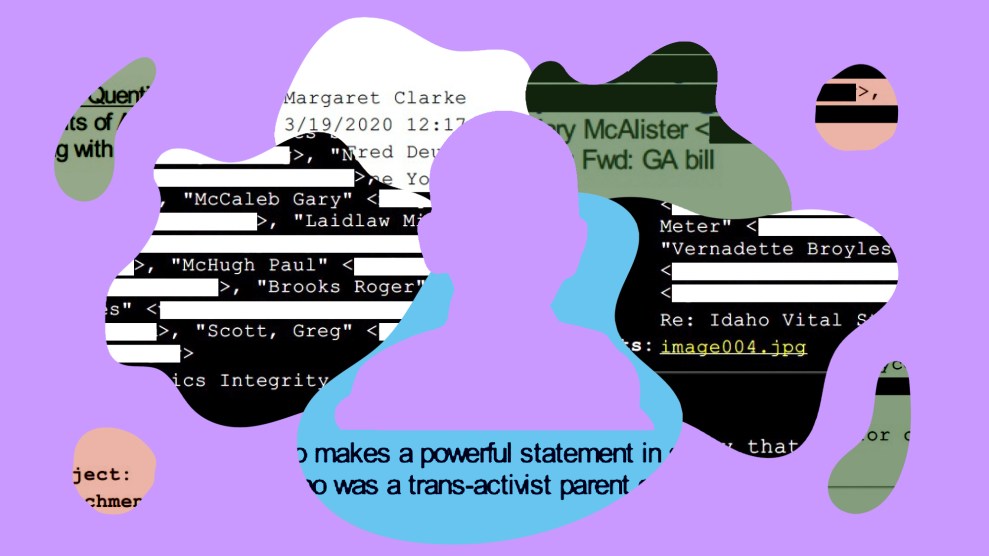
Mother Jones; Getty; Wikimedia
New York Times columnist Pamela Paul argued in a 4,500-word op-ed earlier this month that transgender health care procedures amount to “unproven treatments for children,” despite major medical associations’ support for gender-affirming care and the widespread view that it is lifesaving. The piece, which builds upon Paul’s record of espousing anti-trans views in the pages of the country’s most important paper, was roundly condemned by trans journalists over what they alleged was an argument rife with inaccuracies.
Yet for all the criticism it unleashed, or precisely because of that very criticism, conservative groups seized upon Paul’s piece to pursue anti-trans legal maneuvers. In Idaho, the Alliance Defending Freedom, the powerful conservative legal group known for its critical role behind the strategy that overturned Roe v. Wade, specifically cited Paul’s Feb. 4 column as evidence of the “ostracism, pain, and lifelong regret” young people experience after receiving gender-affirming health care. The legal brief, which aimed to overturn a federal judge’s December ruling that blocked the state from enforcing a ban on gender-affirming health care, was ultimately unsuccessful. But it underscored the right’s enthusiasm for including New York Times pieces that have been accused of cherry-picking data and citing problematic sources in their defenses of anti-trans legislation across the country.
“It’s not surprising that the ADF would cite Paul,” Gillian Branstetter, Communications Strategist from the ACLU’s LGBTQ & HIV Project, told Mother Jones. “They have been working to manufacture doubt around the safety and efficacy of this care.”
My colleague Madison Pauly has reported on this very effort. In May 2023, Pauly uncovered leaked emails that showed ADF working behind the scenes to pressure Republican lawmakers to create some of the most restrictive bills in the country. That strategy often involved citing misinformation and experts some view as unqualified or biased.
Paul appears to follow a similar tactic. In her February piece, Paul claims that some professionals who question the gender-affirming care model feel silenced, afraid that airing public concerns over procedures would get them labeled as transphobic. Paul references Stephanie Winn, a therapist in Oregon who primarily works with parents of gender non-conforming youth “worried that [their] child’s new ‘identity’ may be influenced by peers, media, underlying mental health issues, or trauma.” But Paul failed to mention that Winn is not a neutral professional: She has promoted invasive techniques for parents to encourage their children not to be transgender; and supported theories like “RODG” and hormone imbalance caused dysphoria, both of which have not been supported by science; and testified against Oregon’s ban on conversion therapy.
Paul also appears to follow ADF’s pattern of misrepresenting data. When her piece claims that “30 percent of people on hormone therapy discontinue its use within four years,” Paul declines to include key context to that statistic: The study focused specifically on military families who stopped refilling their hormone replacement therapy prescriptions through Tricare, a health program for active duty service members. In the study, the researchers state “our findings are likely to underestimate continuation rates among transgender patients” because patients may have switched to an alternative insurance plan or private pay. Erin Reed, an independent trans journalist, also pointed out that the last two years of the study data coincided with Trump’s ban on transgender service members, another reason why people may have opted to switch providers. Paul presented the statistic as fact, without scientific or historical contextualization. Paul did not immediately respond to a request for comment, but after publication, a Times spokesperson said in an email that “this column was thoroughly reported and fact-checked, and we stand behind its publication.”
But it isn’t just Paul. The Attorney General of Missouri cited a highly criticized article by Emily Bazelon about gender therapy in an emergency order that restricted gender-affirming care for both trans youth and adults in the state. (As political rhetoric expert Heron Greenesmith told The Texas Observer, “Bazelon did a really great job of replicating their anti-trans talking points.”) The same piece by Bazelon was used in Alabama’s defense of a law criminalizing gender-affirming care for transgender youth. In September, Sen. Josh Hawley name-checked a Times investigation that reported on “whistleblower” Jamie Reed when he launched an investigation into The Washington University Transgender Center at St. Louis Children’s Hospital, Reed’s former workplace. Reed was later accused of misrepresenting the experience of patients there.
“By any objective measure, the paper seems clearly devoted to advocating against this care,” Branstetter said of the Times.
Their coverage, Branstetter said, has led to a serious erosion of trust between the trans community and the Times. “If they want to tell the stories of trans people and the families who have been impacted by these bans, they are burning any trust as fast as they possibly can,” she continued.
This article has been updated to include comment from the New York Times.
















